

Building Resiliency in Young people. DFE-RR097.pdf. How To Thrive. Thrive. Resiliency resource site index. Resilience for the Primary School Student. Resilience and results - a new guide for schools. This free resource aims to help Head Teachers to effectively approach, intervene and take steps to prevent behavioural and emotional difficulties arising in pupils: Resilience and Results: How to improve the emotional and mental wellbeing of children and young people in your school.
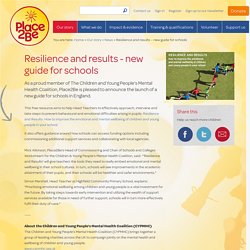
It also offers guidance around how schools can access funding options including commissioning additional support services and collaborating with local agencies. Mick Atkinson, Place2Be's Head of Commissioning and Chair of Schools and Colleges Workstream for the Children & Young People's Mental Health Coalition, said: "'Resilience and Results' will give teachers the tools they need to really embed emotional and mental wellbeing in their school cultures. In turn, schools will see improvements in the academic attainment of their pupils, and their schools will be healthier and safer environments.
" Briefing2_Resilience_in_schools_health_inequalities.pdf. Resilience research - boingboing.org.uk. There is a huge amount of research on resilience.
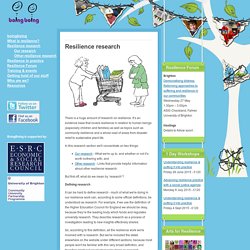
It’s an evidence base that covers resilience in relation to human beings (especially children and families) as well as topics such as community resilience and a whole load of areas from disaster relief to sustainable plant life. In this research section we'll concentrate on two things: Our research - What we're up to, and whether or not it’s worth bothering with, andOther research - Links that provide helpful information about other resilience research. But first off, what do we mean by ‘research’? Resilience Guide for Parents & Teachers. We tend to idealize childhood as a carefree time, but youth alone offers no shield against the emotional hurts and traumas many children face.
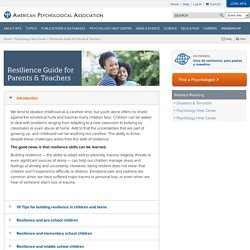
Children can be asked to deal with problems ranging from adapting to a new classroom to bullying by classmates or even abuse at home. Add to that the uncertainties that are part of growing up, and childhood can be anything but carefree. The ability to thrive despite these challenges arises from the skills of resilience.
The good news is that resilience skills can be learned. Building resilience — the ability to adapt well to adversity, trauma, tragedy, threats or even significant sources of stress — can help our children manage stress and feelings of anxiety and uncertainty. Resilience Training in Children. The Penn Resiliency Project Investigators and Co-Directors: Jane Gillham, Ph.D.
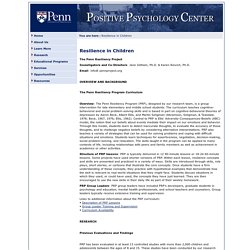
& Karen Reivich, Ph.D. Email: info@ pennproject.org The Penn Resiliency Program Curriculum Overview: The Penn Resiliency Program (PRP), designed by our research team, is a group intervention for late elementary and middle school students. The curriculum teaches cognitive-behavioral and social problem-solving skills and is based in part on cognitive-behavioral theories of depression by Aaron Beck, Albert Ellis, and Martin Seligman (Abramson, Seligman, & Teasdale, 1978; Beck, 1967, 1976; Ellis, 1962). Structure of PRP lessons: PRP is typically delivered in 12 90-minute lessons or 18-24 60-minute lessons.
PRP Group Leaders: PRP group leaders have included PRP’s developers, graduate students in psychology and education, mental health professionals, and school teachers and counselors. A Guide to Promoting Resilience in Children: Strengthening the Human Spirit. Full-Text Publications A Guide to Promoting Resilience in Children: Strengthening the Human Spirit Edith H.
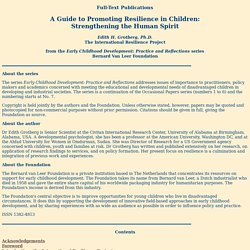
Grotberg, Ph.D.The International Resilience Project from the Early Childhood Development: Practice and Reflections series Bernard Van Leer Foundation About the series The series Early Childhood Development: Practice and Reflections addresses issues of importance to practitioners, policy makers and academics concerned with meeting the educational and developmental needs of disadvantaged children in developing and industrial societies. Copyright is held jointly by the authors and the Foundation. About the author Dr Edith Grotberg is Senior Scientist at the Civitan International Research Center, University of Alabama at Birmingham, Alabama, USA. About the Foundation The Bernard van Leer Foundation is a private institution based in The Netherlands that concentrates its resources on support for early childhood development. Action for Happiness. Resilience. Avoiding life’s challenges completely isn’t possible, but developing the skills to deal with them effectively when they arise will help to guard against potentially catastrophic consequences.
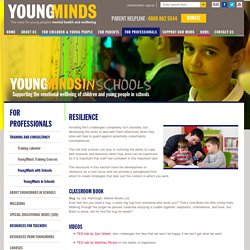
The role that schools can play in nurturing the ability to cope with stresses and adversity when they arise can be significant so it is important that staff feel confident in this important task. The resources in this section have the development of resilience as a core focus and can provide a springboard from which to create strategies that best suit the context in which you work. Classroom book Hug, by Jez Alborough, Walker Books LtdEver feel like you need a hug, a really big hug from someone who loves you? That’s how Bobo the little chimp feels. Videos TED talk by Dan Gilbert, who challenges the idea that we won’t be happy if we don’t get what we wantTED talk by Matthieu Ricard on the habits of happiness Recommended reading.
Untitled.